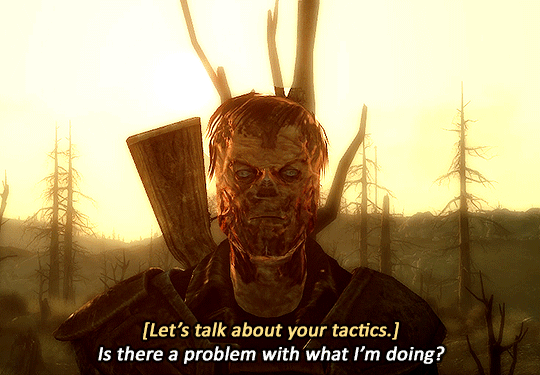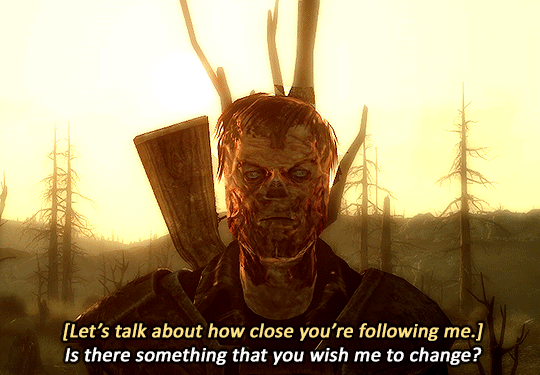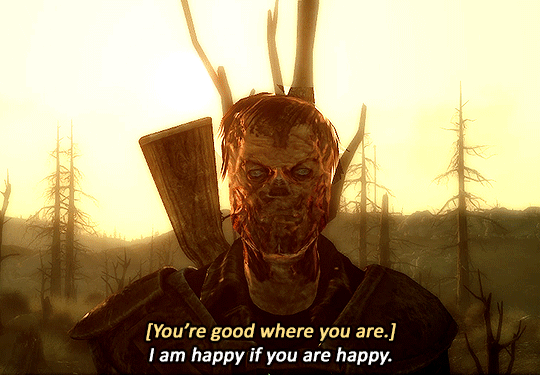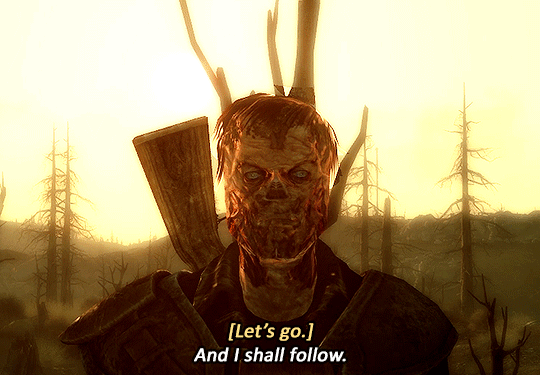Text
["Longing for Human Recognition
As these stories reveal, the therapeutic model of adulthood lends meaning and purpose to young people's lives not through marriage, home ownership, or a career, but instead from self-realization gleaned from denouncing a painful past and reconstructing an independent, complete self. However, simply constructing this alternative narrative— with its individualized markers— was not enough for them to feel like adults. The very acting of telling calls for a witness, a recognizing subject who listens to and validates one's hard-won but tenuous self (see Taylor 1989). Like traditional adulthood rituals that mark the transition from one status to another in a socially recognizable way, then, therapeutic markers also required the participation of others.
Justin is a thirty-one year old black man who works as a server at a casual dining chain restaurant. The son of a factory worker and a secretary, Justin spent six years at a historically black college, finally earning a degree in finance, which he paid for with loans ("It was $17,0000 my first year, and then it kept going up, so..."). Upon graduating, Justin found a job as a death claims clerk at an insurance company in central Virginia and fell in love with a coworker named Stan. After four years, however, the relationship fell apart, dragging Justin into a deep depression that left him unable to get out of bed for three months. Justin finally moved to Richmond in search of a fresh start, and took his current service job after spotting a "Now Hiring" sign in the window. He described: "I"m just kinda like at my rope's end. I've been working here so long that I'm just like... I'm tired of hearing from my mom and family like everyone is like, you've got a degree, why are you working at Applebee's?" Barely breaking even every month as it is, however, Justin is afraid to leave this job in case he can't find another: "It's nerve-wracking to me sometimes because what's preventing me from leaving this job is what's keeping me. It's like, I want a new job but I'm scared of leaving this job because I don't know if that job is going to work out, then... "Justin is trapped, unable to move forward in his journey to adulthood through traditional conduits because of fear of losing what little he has.
Taking stock of his life, Justin ascribes meaning, order, and especially progress onto his stunted experiences of coming of age through alternative ritual: the construction, and public telling, of his story of family suffering and self-realization. Justin narrates his adult self through his struggle to "come out" and claim his sexuality. As he recounted, "There were a few things that hindered me growing up. One of them was, growing up my family doesn't talk about stuff. Like we're a very hush hush family... sex, we never talked about sex, never, ever, ever. And then me being gay, first of all I don't know what sex is. I don't know how to say sex or talk about sex you know so...." Convinced by his religious upbringing that homosexuality was evil, Justin prayed every night that we would wake up the next morning and be straight. After many agonizing years of unanswered prayers, Justin decided that it was time to accept his sexuality as an undeniable part of himself: "I had no choice. You can't. No matter how long you try to repress these feelings. If you're gay, you're gay. That's how I know you're born this way." While he struggles to pay the rent on his studio apartment and has yet to find a long-term romantic partner or a lasting career, he feels a sense of accomplishment that he has faced a painful upbringing and found the strength to claim his authentic self.
Justin's pride in having found the strength to become the person he wants to be, however, is tempered by the fact that he cannot come out to his conservative religious family: "Like no way. No way, Jose." Tragically, Justin believes that his father, who recently passed away from cancer, might have been his only chance for affirmation:
JUSTIN: And before he passed away, I think he was trying to give me a sign that he knew. Because he gave me this big card and it had like a bowl of candy on it and it said, "No matter how sweet you are I will always love you."
JS: So you think he was trying to communicate with you?
JUSTIN: Yeah.
JS: Even though he maybe didn't know how to say it to you?
JUSTIN: Yeah.
This lack of recognition informs the stories of many respondents. Some young people attested that their parents suffer from mental illness, alcoholism, or drug addictions that have left them unable to provide the kind of support and recognition that respondents needed from them. Others simply state that their families or partners do not understand their pain. Vanessa, an unemployed twenty-seven-year-old, constructs her coming of age narrative around a psychiatric diagnosis of bipolar disorder. Following her second divorce, she explained, she went to a party, where she began to hallucinate, perhaps as a result of mixing beer and anti-depressants. When she was hospitalized, she was diagnosed with bipolar disorder and has since reinterpreted her past experiences through the lens of this illness. During our three-hour interview, Vanessa searched her past for signs of her illness, linking the painful events of her life— being bullied at school, fired from jobs for stealing, getting divorced twice, and losing custody of her twins— with the common thread of her disorder. As traditional markers struck her as unsustainable, understanding her past and breaking free from unhealthy relationships became central to her definition of adulthood: "Since my divorce, I have been on my own for the first time in my life. I have not had anybody controlling me but myself.... I have only been an adult for six months (sobbing), I have learned a lot along the way."
But Vanessa's parents— a field machinist and a medical records coder, whom she described as traditional, religious, and Southern— viewed their daughter with a mixture of sadness, bewilderment, and disdain: "They just look at me and say, 'What is wrong with you? Why can't you get a job, why aren't you taking care of your own kids?' And I am like, you grew me up doing certain things, and this is what happened because of it, so you can't blame me." Her parents— as potential witnesses— did not judge her performance of adulthood as authentic. Unable to afford therapy, she joined an online bipolar support group but soon quit because she felt ignored: "It was all about [the founder of the group], you see, she would take up most of the time to talk. She didn't think that other people there would need people to talk to as well." Today, Vanessa continues to search for sources of validation.
For Justin and Vanessa, their chosen witnesses could not identify with their performance; building on Illousz (2008), we can see how generational differences in emotional expression become an insurmountable obstacle to communication. That is, the categories they use to understand themselves are not shared by their parents who came of age just forty years before them and for whom "coming out", battling mental illness publicly, defeating a legacy of alcoholism, or choosing art school over a stable career or family are incomprehensible.
When young men and women cannot communicate their feelings of anger and betrayal to those who wronged them, their coming of age stories remain unvalidated. As Isaac, a twenty-four-year-old black man who works as a stocker at a discount retail company, confessed poignantly: "When I would try to tell them what was really going on or things that I had on my mind, it's like I was talking to a brick wall. Sometimes like now with things, I have a lot of memories that I would like to forget in the back of my head. There are things that I've held inside that I wanted to tell them for a long time. But you know I've just held it in for so many years."
In telling their story to a witness— especially one who hurt or betrayed them— respondents imagine that their accounts will be honored, thereby allowing them to finally move beyond the painful memories that anchor their identities in the past. Within the mood economy, human recognition becomes a key to dignity and self-respect, in short, to finally appraising oneself as adult, complete, and fully human. Telling one's story is thus an interactional accomplishment, reliant on social recognition for validity and authenticity (Davis 2005). When a witness cannot hear their story— or discredits their account— working-class young people become suspended in a narrative of suffering, and the ritual fails to produce a newly adult self. These respondents thereby become trapped in the mood economy, unable to attain human recognition, dignity, or self-respect. Once again, the transition to adulthood is inverted, a coming of age means accepting that they are alone, dependent on others at their peril."]
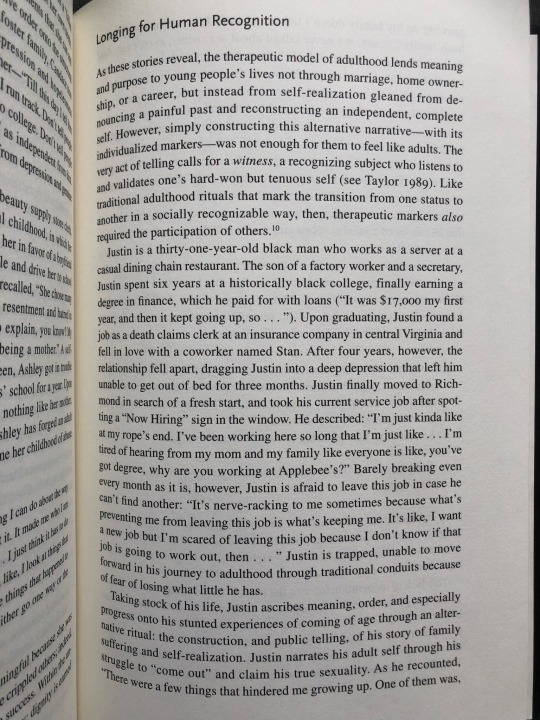


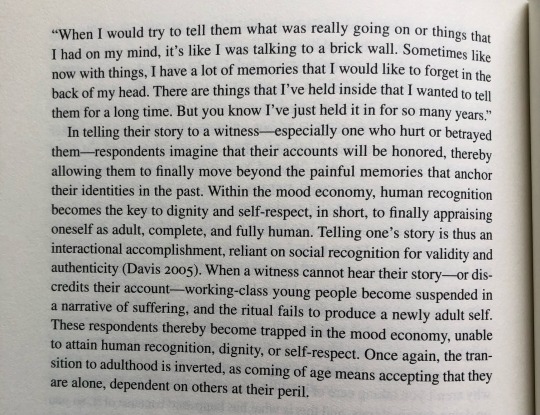
jennifer m. silva, from coming up short: working-class adulthood in an age of uncertainty, 2013
56 notes
·
View notes
Text
["It is easy for men to experience themselves as somehow locked within themselves, wanting to reach out to others but feeling unable. It is as if through the process of growing up we have learned to leave our emotional selves behind. Within modernity we have learned to identify ourselves as rational agents in a way that makes access to our emotions seem threatening, for it can challenge the image that we learn to sustain of ourselves, of being "free" and "independent." Within the dominant male culture we learn to treat women as sexual objects and to put them down and diminish their experience as a way of asserting ourselves.
It is partially because of the suppression of our emotions and feelings that we are left with a thin relationship to our inner selves. We can feel strong and effective in the world of work where we know the rules and where we are constantly relating to others, but in our emotional lives we can find it much harder to express ourselves personally. We can be so used to the impersonal mode as a way of protecting our vulnerability in the public world that we do not know how to put this aside, even when we want to. But those difficulties are often hidden because we learn to rely on women to do the emotional work for us.
We can be so used to constructing our experience according to how we think things ought to be, that it can be difficult to acknowledge any emotions and feelings that go against these images. This reflects a cognitive constructivism that had become widespread within otherwise quite opposed traditions of social theory. It says that our experience is "socially constructed," assuming that this is a strong position to take against the traditional idea that, for instance, gender roles are "natural" and so cannot be changed, without at the same time recognizing that this rationalism reflects another prevailing aspect of a dominant masculinity.
It means that we can shape our experience according to our will and determination, and that we are free in liberal terms to relate to others as we choose. If our partners say that they feel we are taking them for granted, we assume that we can simply deny this because it was not our intention, since for rationalism it is often a matter of 'who is right' and 'who is wrong.' As long as we know that 'I am right' then this would seem to be the end of the matter. The fact that they continue to feel that way has to do with their 'personal feelings' or 'subjective experience,' but it supposedly has no existence 'in reality.'
This can feel coercive to our partners who might well feel that they are not being listened to. They might feel that there is little real contact. As men we might hear this defensively, feeling accused that we must have done something wrong. It can be difficult for us to recognize that we are tacitly legislating what our partners can feel— for we are saying that 'they cannot feel taken for granted because we are not taking them for granted' or 'they cannot feel as if they are being treated as a sexual object for this is no part of our intention.' If they persist in feeling this way after they have been assured that their emotions or feelings have no basis in reality then they are being 'irrational.' As men we feel that there is little else to be done until our partners are prepared to 'see sense.' We might choose to put the issue aside, hoping that it will go away."]
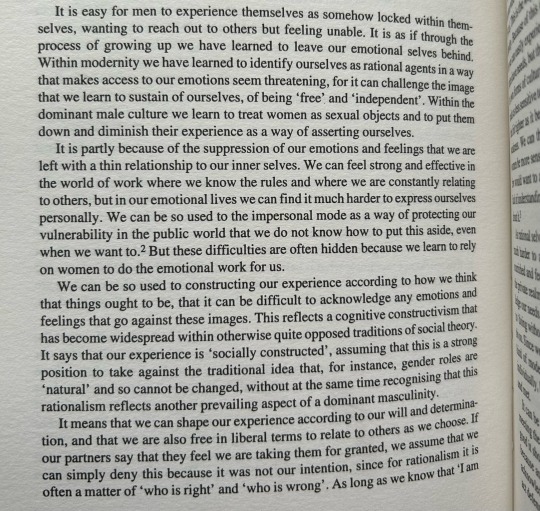
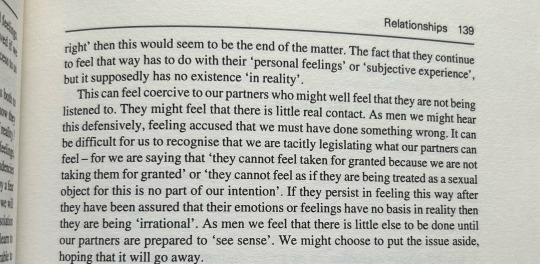
victor j. seidler, from unreasonable men: masculinity and social theory, 1994
39 notes
·
View notes
Text
["Reinforcing Factors
Reinforcing factors are, obviously, those which reinforce and support a process that may have already begun. The reinforcing factors do not necessarily need to be about gender orientation to reinforce the process. Experiences such as taking her own power by making an important decision or asserting her needs, as well as paying attention to her own intuition and insight, can be great reinforcers along the way to discovering and uncovering personal identity and gender orientation. Examples could be, again, the developing ability to "know" what her society isn't helping her to know, or a significant woman or lesbian friend or other lesbian or bisexual role model who offers her support for her declaration that she is, indeed, lesbian or bisexual. A friend or family member who sees her confusion and wants to support her right to find her own life can be a very significant reinforcer.
Learning to take their own judgment and ideas seriously, that is, getting past diffusion identity status to moratorium identity status (on their way to identity achievement— see Chapter 3 on identity formation) was a significant change for the interview respondents. Respondent #1, age thirty-six, describes a process of self-discovery that reinforced her self-confidence and self-assurance and encouraged her to continue to make her own decisions:
I was very happy for many years as an at-home mom and taking care of the kids, but something had kind of completed itself, and I was ready to do something different with my life. For the most part, I was happy for many years. I would say, for the last five years of my marriage, I wasn't happy. And as I look back, there are times I was probably, you know, would have profited from seeking psychiatric help or something that would make the blue go away. You know, make it not so gray. But I didn't know at the time that was a possibility. It was like I never had any experience like my parents, my in-laws; nobody around me had ever even suggested that or experienced that.... [counseling] was a possibility. It was just like, yeah, some people do that but I didn't know anybody that did. And I thought I could do this by myself.... "Okay, it's kind of blue and gray, but I can do this." And I did, but I look at a time when I just didn't want to get out of bed; I didn't want to. The robotic action of get up, make breakfast, clean the house, do the dishes, do the laundry, make lunch; it was just like very robotic and that the heart of keeping the home managed had gone out of it... When I look back now, it's like, that was not OK, and the whole thing became robotic.... I had to take care of my kids, and I knew it wasn't just them that was creating that; it was like I had something else going on, and once I made the big, explosive decision, "I don't care what anybody says, I'm going to school," a whole lot of stuff started falling. People started thinking, "What is she doing?" My parents were like... "What do you want to do that for?" My husband was very— a lot of reaction that was like this. And I said, "I'm going to do this".... That voice shocked them more than my wanting to go to school, I think.
When respondent #21, age thirty, was asked a direct question about herself, she realized that the process taking place inside of her could be valid, primarily, because her friend saw it and opened up her thinking:
Well, the night before Take Back the Night at Ellie's apartment and we're getting set, we're making up signs for the march, we're painting the banner, and I'm looking at her books and see she has some books on bisexuality and stuff like that. And we're talking back and forth and she says, "Marian, are you straight?" And I say, "I'm a married woman; of course I'm straight." She says, "That doesn't mean anything; come on Marian, think about it. Are you straight?" And I'm having all these crushes, all those teachers, Sue, and I think, "I'm bisexual!" Oh my God, kind of laughed with that, feeling happy and scared at the same time. And [then] I thought I was bisexual because I was married to a man."]
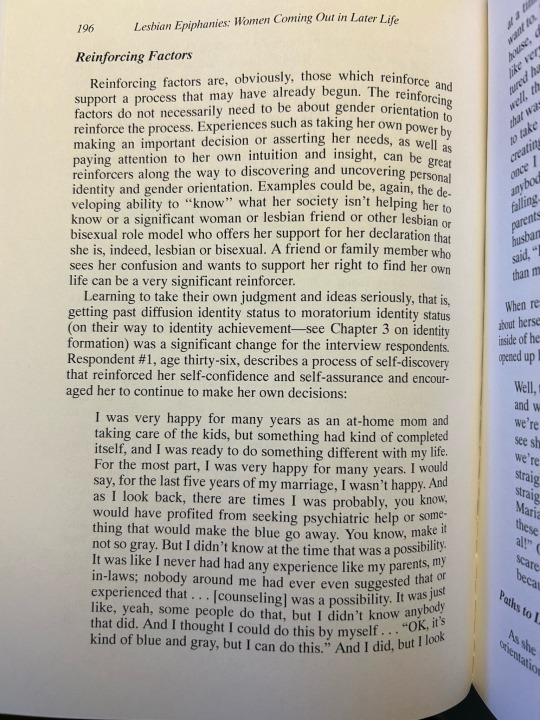
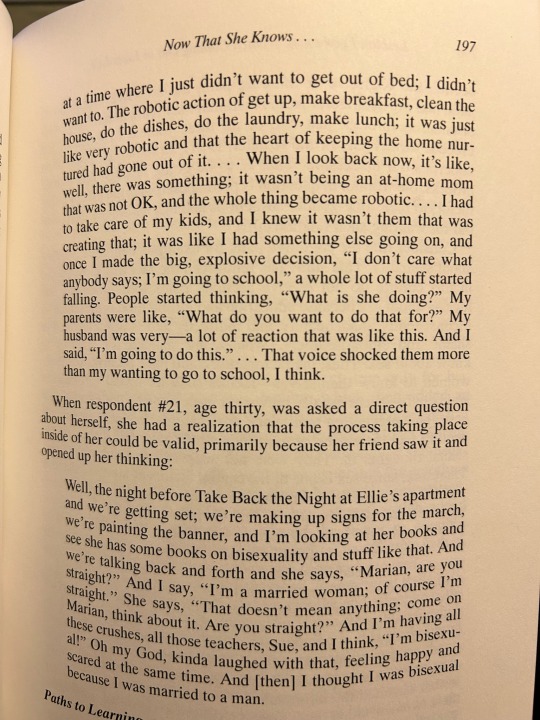
karol l. jensen, from lesbian epiphanies: women coming out in later life, 1999
20 notes
·
View notes
Note
hi there, I'm sorry if this is a super intrusive question, you don't have to answer- i was wondering how you found someone willing to do a hysterectomy on you at your age? I've been trying for two years to find someone who will do one on (what people perceive as) a healthy cis woman just by choice. Granted, I live in the Midwest, moving to the south at the end of the year, but if you have any tips or tricks for finding doctors, or getting ones in your area to listen to you and not just tell you you'll need it for babies someday, I would be very grateful if you're willing to share 🙇♂️
pnw here and it helped that I already had a history of forming massive tumors over and over and over again, they’d already cut so many monstrous globules out of me that taking out the factory that produced the bulk of them just made sense.
just start making hideous blobs that want to kill you!
22 notes
·
View notes
Text

what a universe……
a stud in black leather on a black motorcycle just revved their engine at me and thank god I tore my demonic uterus out ages ago because I think that would have finally knocked me up
3K notes
·
View notes
Text
concept: extremely sweet and caring guys that fuck you like an animal in heat
62K notes
·
View notes
Text
a stud in black leather on a black motorcycle just revved their engine at me and thank god I tore my demonic uterus out ages ago because I think that would have finally knocked me up
3K notes
·
View notes
Text
fifty thousand year old geological memories of f!lone wanderer/charon rising to the surface
8 notes
·
View notes
Text
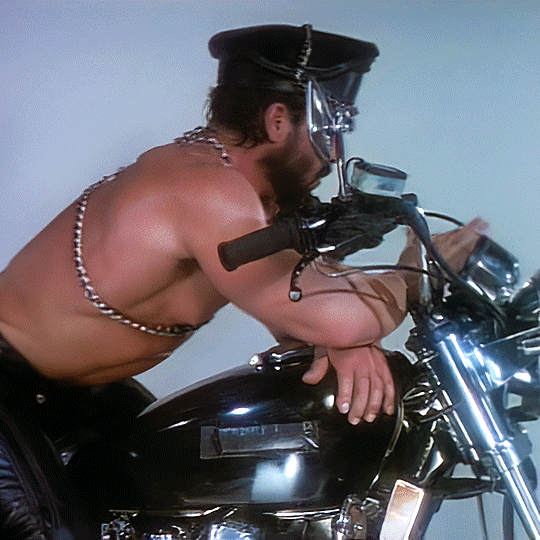

MARK ALEXANDER
"Fog Bound" - The Leather Report (1988) dir. Gunner Hyde
3K notes
·
View notes
Text

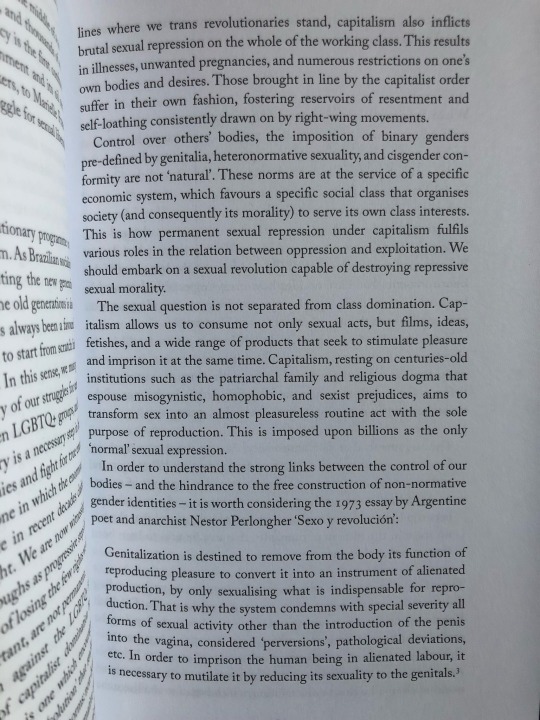
virginia guitzel, from notes from Brazil, from transgender Marxism, edited by joanne gleeson and elle o’rourke, 2021
133 notes
·
View notes
Text
Whatever she is, the trans woman is always not herself; she is a representation of gender trouble writ large. Her own account can only be received with suspicion, yet much is demanded from her. Not only must she offer an account for her gender, but for yours as well.
— Jules Joanne Gleeson & Elle O'Rourke, Transgender Marxism
476 notes
·
View notes
Text
["In 1985 Barbara Smith came like a fresh wind into Chapel Hill. She brought with her a vision of home unlike anything I had imagined it would be years before I would look up to find that as I searched for home I continued in my isolation. It was the death of Pat Parker that first alerted me to the fragility of both our dreams and our community. First her then Joe Beam then Donald Woods then David Frechette then Rory Buchanan then James Baldwin and Roy Gonsalves then Audre Lorde herself. In response I wrote:
I could have fucked him
Head on rumpled pillow
Ass lifted towards heaven
Like she cat
In season
In heat
I might have cut into flesh
Leeched out blood
Bitten into gristle
And Swallowed
And yet
And Still
I tried saving him long distance
Tied up phone lines preaching brotherhood
Wrote treatises on community
Debated love and metaphysics at the institute
Took clever men to bed
Shall I scratch his name onto parchment
Press it to my lips
Arrange it among relics on my altar?
Shall I build a memorial
Great Edifice Reaching forth to God
Higher than misery?
I showed this, my only attempt at poetry as an adult, to my boyfriend at the time, who told me that the "she cat" line made him uncomfortable. We broke up. I left for the comfort of my girlfriends. He started dating women. We both resisted the somewhat Afrocentric, Brooklyn-centered black lesbian and gay community, finding that our own deepest desires had turned back in on themselves.
I'm a queer lesbian/ Please don't go down on me yet/ I do not prefer cunnilingus/ (There's room for me in the movement.)
Cheryl Clarke, "Sexual Preference." in Living as a Lesbian (Ithaca, N.Y: Firebrand, 1986)
Cheryl phones on an early weekday morning looking for a hundred dollars and advice. I write a check for fifty and remain on the television for hours debating the relative merits of worry versus denial. She complains that too many of the wrong kind of women love her. I answer that that's my problem exactly. We laugh, make plans to see each other, and hang up. The two of us maintain a type of charming delicacy with each other. I respect her boyishness as she cherishes my effeminacy. We are a couple, mentioned in one breath as dinner parties are planned, given to public quarrels over the minutiae of everyday life, constantly aware of each other's steps and jealous of the intrusion of outsiders. Our lesbianism runs deep. We are drawn together because of our profound love of women, our unquenchable thirst for companionship, our hot-blooded sexual passion, and our constant struggle to find and create home."]

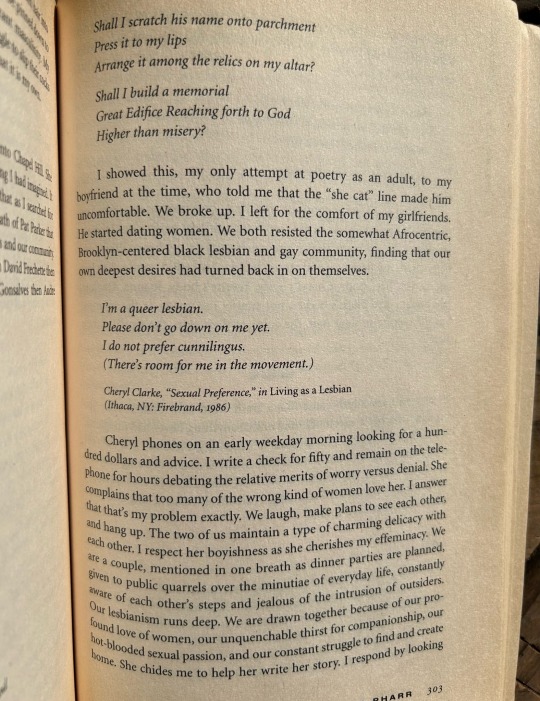
robert f. reid-pharr, from living as a lesbian, from Sister & Brother: Lesbians and Gay Men Write About Their Lives Together, 1994
33 notes
·
View notes
Text
The berry pickers creed
I will leave unripened berries untouched
A ripe berry need only be negotiated with, not fought
I will reasses my surroundings after every step, for my new perspective could reveal a berry patch previously hidden to me
The plant gets excited and happy when a barry is picked
The bug is not to be feared or killed, but gently celebrated, for it facilitated in the creation of the beloved berrys
I will not allow myself to be bullied by sharp thicket and I will retrieve even the most protected barry
19K notes
·
View notes
Text
16K notes
·
View notes
Text
you have to stay alive. you're going to be such a beautiful middle aged freak. young freaks will see you in the street and know that things can be okay.
101K notes
·
View notes

